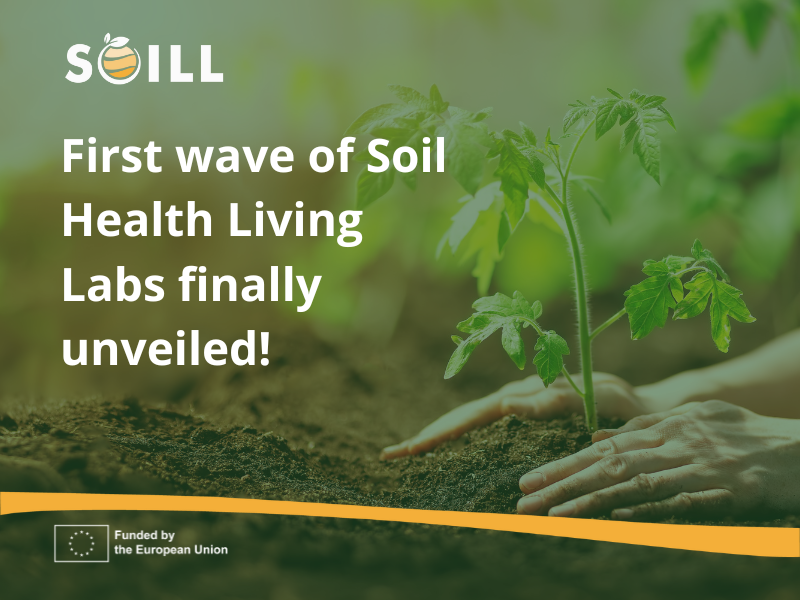
As part of the Soil Mission’s effort to tackle soil threats and reduce the EU global footprint, the creation of a 100 Living Labs and Lighthouses represents a holistic effort of tackling issues such as land degradation, pollution, soil biodiversity and others. In a collective effort to foster knowledge-exchange and innovation, the first set of 25 Soil Health Living Labs in a series of (expected) 100 have been unveiled as the funded projects establishing them kicked off their work across Europe. Funded by the Soil Mission Work Programme 2023, the following transnational multi-actor projects are making strides in setting up living labs in different geographical contexts.
GOV4ALL empowers all stakeholders in soil sphere to take action and collaborate effectively. The project, coordinated by SAE Innova, will not only protect the natural resources but also boosts economic opportunities for rural communities, with the long-term sustainability for soil health at the heart of it. Since GOV4ALL’s implementation, five agro-innovation hubs have sprouted across France, Greece, and Spain – demonstrating a unique opportunity for farmers, scientists, NGOs, policy-makers and the public to come together and determine the future of soil health. In June 2024, GOV4ALL held its kick-off meeting in Cartagena, Spain, with over 60 participants and 36 partners engaging in series of workshops and presentations. Follow GOV4ALL on LinkedIn
Launched in June 2024, Living SoiLL enhances the overall resilience of soil and contributes to its nourishment by establishing 5 Living Labs in Portugal, France, Spain, Italy, and Poland. The maintenance of LLs is one of the largest to date, with more than 2000 local actors actively participating across 50 demonstration sites and 10 lighthouses. By focusing the challenges faced by permanent crops, such as vineyards, olive groves, chestnuts, hazelnuts, and apple orchards, LivingSoiLL impacts the overall soil structure, reducing erosion, and enhancing the biodiversity of soil. Alongside the collaborative approach between researchers and farmers, LivingSoiLL will also produce policy recommendations on the best soil management practices, thus advancing the EU’s indicators for healthy soil. For more news and updates on Living SoiLL, check out their LinkedIn!
Similarly to Living SoiLL and GOV4ALL, iCOSHELLs seeks to bridge the gaps between science and practical applications for soil management, and replicating effective soil preservation methods. Currently, this initiative aims to establish six Soil Health Living Labs in various geographical contexts, including Sweden, Spain, France, Italy, Greece, and Bulgaria. The co-creation and real-world application soil practices established within these SHELLs, aim to promote a pathway and best practices for the future LLs. During the last month, iCOSHELLs gathered for the first time in Gothenburg, Germany – mapping out the future steps for the support of the six SHLLs. Therefore, iCOSHELLs not only offers networks of collaboration, but ensures the replicability and sustainability of Mission Soil’s efforts. Follow the latest updates on their soil journey through their LinkedIn page!
The most recent addition amongst the transnational LL facilitation projects, SOILCRATES began its work at the beginning of October. During the project lifetime, four sustainable LLS based in the Netherlands, France, Ireland, and Spain, will be tasked with improving and monitoring of the soil life, and crop-growing conditions of mineral soils. While SOILCRATES is guided by the co-creation and knowledge exchange approach as its fellow initiatives, the ambition of SOILCRATES is to go beyond the enhancement of soil health, and also focus its efforts in extensive soil literacy in society. The innovative practices and knowledge produce will be available to the wider public through a set of policy briefs. SOILCRATES aims to combine its soil health sustainability efforts with that of other LLs, sister projects, JRC, and EUSO.
The aforementioned LLs primarily focus on co-creating best practices for soil health, but its LILAS4SOILs that steer their focus solely to carbon farming. LILAS4SOILs plans to implement Carbon Farming Practices (CFPs) across 85-100 demo-sites in six countries through five Living Labs. Specifically, the LLs will focus on practices best used for advancement of soil organic carbon, dividing the areas of interest into: peatland management, SOC enhancing, agroforestry, living management, and nutrient management. In the course of the next five years, the initiative will gather 24 expert partners and over 50 farmers, all in an effort to elevate the various CFPs and their impact, while utilizing advanced Monitoring, Reporting, and Verification (MRV) technologies. The LILAS4SOILs held their kick-off event on September 24th, 2024 - an occasion for bringing together stakeholders across the sectors, including researchers, local authorities, agrifood businesses, and farmers. As they make important strides in carbon farming across Europe, follow the LILAS4SOILs team via their LinkedIn page!